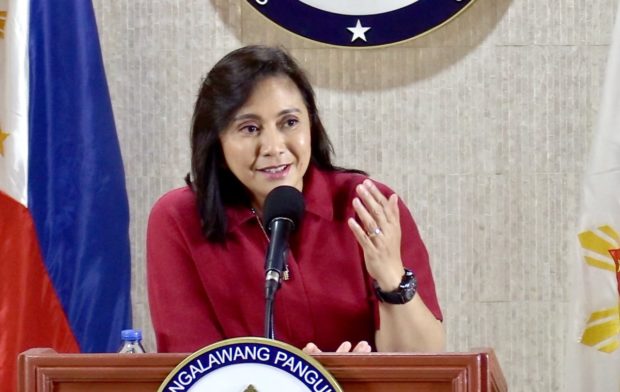VP Robredo on ECQ extension: Tough but right decision
MANILA, Philippines — Extending the enhanced community quarantine (ECQ) period in some areas due to the coronavirus disease 2019 (COVID-19) pandemic is a tough balancing act that had to be done, Vice President Leni Robredo said on Monday.
Robredo said that even before President Rodrigo Duterte decided on the ECQ extension in several high-risk areas in the country including Metro Manila, she met with a team from the University of the Philippines which pointed out areas that remain vulnerable from the novel coronavirus.
“It’s a tough balancing act… Tingin natin kailangan talaga i-extend doon sa mga areas na napakataas pa ng risk (It’s a tough balancing act… But we think there really is a need to extend the quarantine in areas where the risk remains high),” Robredo said in an interview with CNN Philippines.
“Mahirap siyang decision kasi kailangan mo parating ibabalanse sa ekonomiya, ibabalanse dooon sa mga malaki yung tama sa mga ordinaryong mamamayan, pero kailangang gawin,” she added.
(It is a tough decision because we always have to balance it with the economy and balance it with our countrymen who will be adversely affected, but it has to be done.)
The ECQ extension until May 15 covers Metro Manila, Central Luzon, Calabarzon, as well as the provinces of Pangasinan, Benguet, Albay, Catanduanes and the Mindoro provinces.
Presidential spokesperson Harry Roque, however, announced that the extension of ECQ in the provinces of Benguet, Pangasinan, Tarlac, and Zambales is still subject to “re-checking” and may still be revised by April 30.
Meanwhile, several low-risk areas were placed under general community quarantine (GCQ). This means that restrictions in some sectors and activities have been eased.
Robredo likewise said it was a “good move” to place some areas under GCQ.
“I think it’s a very good move. Ito yung mga areas na identified na low-risk pero hindi ito insurance na hindi sila magkakaroon ng further contamination (These are the areas identified as low-risk but it’s not an insurance that they won’t have further contamination),” Robredo said.
“Kapag tiningnan natin yang elements ng GCQ, hindi total [easing] of everything, mayroon lang ibang nire-relax… hindi pa rin ito balik sa dati. Tingin ko very good move ito kasi ito ang pagbabalanse ng ekonomiya tsaka ng health prevention,” she added.
(If we look at the elements of GCQ, it’s not total easing of everything, some are just relaxed but it’s still not back to normal. I think it’s a very good move because this is balancing economy and health prevention.)
In areas under GCQ, the opening of non-leisure shops in malls is allowed along with the resumption of priority and essential construction projects.
Partial operations of public transportation systems will also be allowed.
Several industries such as agriculture, fishery, forestry, food manufacturing, packaging, food retail, supermarket, restaurants (for takeout and delivery), hospitals, logistics, water, water, energy, internet, telecommunications, and media may also have “100 percent” resumption of operations.
GSG
For more news about the novel coronavirus click here.
What you need to know about Coronavirus.
For more information on COVID-19, call the DOH Hotline: (02) 86517800 local 1149/1150.
The Inquirer Foundation supports our healthcare frontliners and is still accepting cash donations to be deposited at Banco de Oro (BDO) current account #007960018860 or donate through PayMaya using this link.
